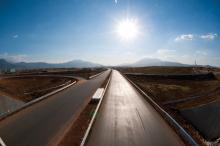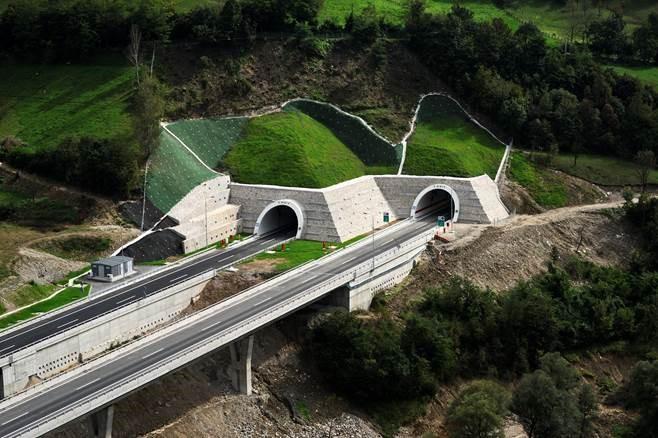The European Bank for Reconstruction and Development (EBRD) is providing major funding in Albania’s road network. A loan worth €53 million will help pay for the construction of the new Fier and Vlore bypasses. This loan will aid further development of the Albanian road network and boosting economic integration in the country by co-financing the construction of the two bypass roads, located in south-western Albania. The EBRD loan is structured in two tranches and will be used by the Albanian Road Authority t
RSSThe 1166 European Bank for Reconstruction and Development (EBRD) is providing major funding in Albania’s road network. A loan worth €53 million will help pay for the construction of the new Fier and Vlore bypasses. This loan will aid further development of the Albanian road network and boosting economic integration in the country by co-financing the construction of the two bypass roads, located in south-western Albania. The EBRD loan is structured in two tranches and will be used by the Albanian Road Authority to build a 22km bypass in Fier and a 29km bypass in Vlore. The project is being co-financed by the 1054 European Investment Bank (EIB) and the European Union. The two bypasses form key sections of Albania’s national road network which will connect important roads previously financed by the EBRD and EIB.
The project will reduce congestion in the two cities, boost economic integration in the region, and underpin the development of tourism in southern Albania. “The EBRD is one of the main investors in Albania’s infrastructure and through this latest project we support further modernisation of Albanian roads. This project will help improve the quality and safety of transport in the cities of Fier and Vlore, bringing benefits to people and businesses, and the country’s economy overall,” said Jean-Marc Peterschmitt, EBRD managing director for Central and South Eastern Europe. The EBRD loan is complemented by grant financing worth a total of €5.95 million, which will be used for technical assistance in the preparation of detailed designs for the two bypass roads, as well to support project implementation. In addition a road tolling strategy for Albania and a study on sustainable transport policies in the country will be developed as part of this financing.
The grants are provided by the Italian government, the European Union and the Western Balkans Investment Framework. Since the beginning of its operations in Albania, the EBRD has invested over €665 million in various sectors of the country’s economy, mobilising additional investments of more than €1.3 billion. This project forms part of a larger strategy that will see the development the road network in the Western Balkans. Albania has already upgraded the highway linking it with neighbouring Kosovo, with traffic volumes far exceeding those predicted originally by the2332 World Bank. Meanwhile Kosovo is busy rebuilding its Route 7 that carries traffic from the Albanian border crossing to its capital Pristina. At the same time, Kosovo has plans to build Route 6 to connect with Macedonia, which is itself working on its links to other nations. The Albania-Kosovo route is of key importance to both nations as it will reduce journey times, help develop trade and provide landlocked Kosovo with a link to a major port in its close political ally Albania. In addition the authorities in Bosnia and Herzegovina are in discussions with the counterparts in neighbouring Montenegro and officials at 5543 Albania's Ministry of Public Works and Transport. The talks focus on the reconstruction and modernisation of the Sarajevo-Podgorica-Tirana highway. Bosnia's board of ministries said that the memo is confirmation that the EC and other institutions will finance the project. Details have not been disclosed at this stage.
The project will reduce congestion in the two cities, boost economic integration in the region, and underpin the development of tourism in southern Albania. “The EBRD is one of the main investors in Albania’s infrastructure and through this latest project we support further modernisation of Albanian roads. This project will help improve the quality and safety of transport in the cities of Fier and Vlore, bringing benefits to people and businesses, and the country’s economy overall,” said Jean-Marc Peterschmitt, EBRD managing director for Central and South Eastern Europe. The EBRD loan is complemented by grant financing worth a total of €5.95 million, which will be used for technical assistance in the preparation of detailed designs for the two bypass roads, as well to support project implementation. In addition a road tolling strategy for Albania and a study on sustainable transport policies in the country will be developed as part of this financing.
The grants are provided by the Italian government, the European Union and the Western Balkans Investment Framework. Since the beginning of its operations in Albania, the EBRD has invested over €665 million in various sectors of the country’s economy, mobilising additional investments of more than €1.3 billion. This project forms part of a larger strategy that will see the development the road network in the Western Balkans. Albania has already upgraded the highway linking it with neighbouring Kosovo, with traffic volumes far exceeding those predicted originally by the







